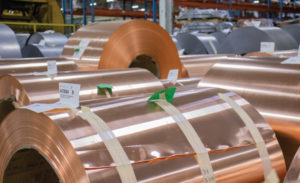Exploring the Versatility and Durability of Cutting-edge Copper Products in Modern Design
Exploring the Versatility and Durability of Cutting-edge Copper Products in Modern Design
Blog Article
Exactly How Copper Products Add To Sustainable Practices in Various Markets
In eco-friendly energy systems, for example, copper enhances the performance of solar and wind modern technologies, while its application in building and construction lessens waste via longevity. As sectors look for to adopt even more lasting techniques, the role of copper could verify critical in accomplishing ecological objectives.
Copper in Renewable Energy
Copper plays a crucial role in the improvement of eco-friendly power technologies, offering as an essential conductor in various applications. Its extraordinary electric conductivity and resistance to deterioration make it an excellent material for electrical circuitry, which is essential in solar panels, wind turbines, and energy storage systems. In solar photovoltaic systems, copper is used in the interconnections and circuitry, enabling reliable power conversion from sunlight to electrical power.
In wind power, copper is indispensable to the generators and transformers that transform kinetic power right into electric power, making sure optimum efficiency and dependability. In addition, the demand for electrical lorries (EVs) is boosting, with copper being an essential part in batteries, motors, and charging infrastructure. The shift to EVs dramatically improves the demand for copper, as these vehicles commonly utilize four times much more copper than standard inner combustion engine lorries.
As the world looks for to alleviate climate change and change to lasting power resources, copper's function comes to be significantly critical. The material not only enhances the effectiveness and durability of renewable resource systems however additionally supports the broader goal of reducing greenhouse gas discharges and advertising a sustainable future.
Eco-Friendly Building Products
In recent years, there has been a noteworthy change towards the fostering of green construction products in response to growing ecological concerns. This change is encouraged by the need for sustainable choices that decrease eco-friendly footprints while preserving structural stability and visual allure.
Copper, known for its longevity and recyclability, has become a principal in this field. It can be made use of in roof, pipes, and electric systems, contributing to energy effectiveness and decreasing waste. Copper's durability implies less replacements with time, additional improving its sustainability account.
Furthermore, products such as bamboo, redeemed timber, and reused steel are getting appeal. These choices not just use decreased ecological impact yet likewise advertise resource preservation. As building codes progressively emphasize sustainability, home builders and designers are incorporating these materials into their projects, promoting innovation in style.
The increasing fostering of eco-friendly building products mirrors a wider commitment to sustainability in the constructed atmosphere. By prioritizing these materials, the building and construction market can dramatically decrease its carbon footprint, line up with governing criteria, and sustain a much healthier ecosystem for future generations. This pattern notes a critical action towards a more lasting future in building.
Copper's Function in Health care
Recent research studies have highlighted the substantial duty of copper in healthcare setups, specifically due to its antimicrobial properties. Copper surface areas have actually been revealed to lower the presence of pathogens, consisting of viruses and microorganisms, by approximately 99.9% within a brief duration. This impressive efficiency makes copper an indispensable material for high-touch surface areas in healthcare facilities, such as doorknobs, bed rails, and IV posts, consequently adding to enhanced infection control procedures.
Along with its direct antimicrobial effects, copper additionally contributes in the wider context of hospital sustainability (Copper Products). By integrating copper right into medical tools and furnishings, healthcare centers can reduce the occurrence of healthcare-associated infections (HAIs), which not just enhances patient end results yet likewise decreases the prices related to extended hospital keeps and extra therapies
Moreover, copper's resilience and recyclability straighten with sustainable techniques, permitting for responsible source management. As medical care systems increasingly focus on both patient security and environmental stewardship, the assimilation of copper products is becoming much more widespread. This dual advantage emphasizes copper's vital contribution to a healthier, safer, and more sustainable healthcare setting.
Sustainability in Transportation

Moreover, copper's longevity and deterioration resistance add to the longevity of transport facilities (Copper Products). In rail systems, for circumstances, copper components improve the dependability and effectiveness of signaling and power systems, essential for lowering delays and energy intake. In addition, copper's role in renewable energy systems, such as solar and wind, supports sustainable transportation services by providing clean energy for electrical transportation alternatives
Investments in copper technology not Get the facts only foster sustainability but additionally stimulate financial growth and job creation in eco-friendly sectors. As sectors strive to meet strict environmental regulations, the application of copper items in transport arises as a critical technique in accomplishing sustainability goals and promoting a cleaner, more reliable future.
Copper and Round Economy
As the globe increasingly welcomes sustainability, the role of copper in the round economy ends up being ever more significant. Copper's intrinsic properties-- such as its conductivity, recyclability, and sturdiness-- placement it as a key product in a resource-efficient economic climate. The circular economic situation aims to reduce waste and optimize resource use via recycling and reusing products, and copper excels in this regard.
The steel can be reused indefinitely without loss of quality, making it an optimal prospect for lasting techniques throughout numerous industries, consisting of building and construction, electronics, and eco-friendly power. By recycling and recovering copper from end-of-life products, industries can significantly lower the requirement for virgin materials, consequently lowering ecological impacts associated with mining and processing.
Additionally, the combination of copper right into round economic climate frameworks not only saves sources yet additionally fosters technology. Companies go to website that prioritize copper recycling contribute to a more lasting supply chain, enhancing their competition while straightening with governing needs and consumer choices for eco liable products.
Final Thought
In verdict, copper items substantially add to sustainable practices throughout several industries. Their important function in enhancing renewable energy modern technologies, promoting green construction materials, supporting infection control in health care, facilitating sustainable transportation, and symbolizing the principles of a circular economic climate underscores the flexibility and relevance of copper. By integrating copper into various applications, sectors can achieve better efficiency, decrease environmental effect, and align with global sustainability goals, inevitably cultivating an extra sustainable future.

Copper's outstanding conductivity makes it a recommended product in electrical car (EV) systems, enhancing energy performance and efficiency. In addition, copper's role in renewable power systems, such as solar and wind, supports lasting transportation solutions by supplying tidy energy for electric transportation alternatives.
Their essential function in boosting sustainable power modern technologies, advertising eco-friendly building and construction materials, supporting infection control in healthcare, helping with sustainable transportation, and personifying additional hints the concepts of a round economic climate emphasizes the adaptability and importance of copper.
Report this page